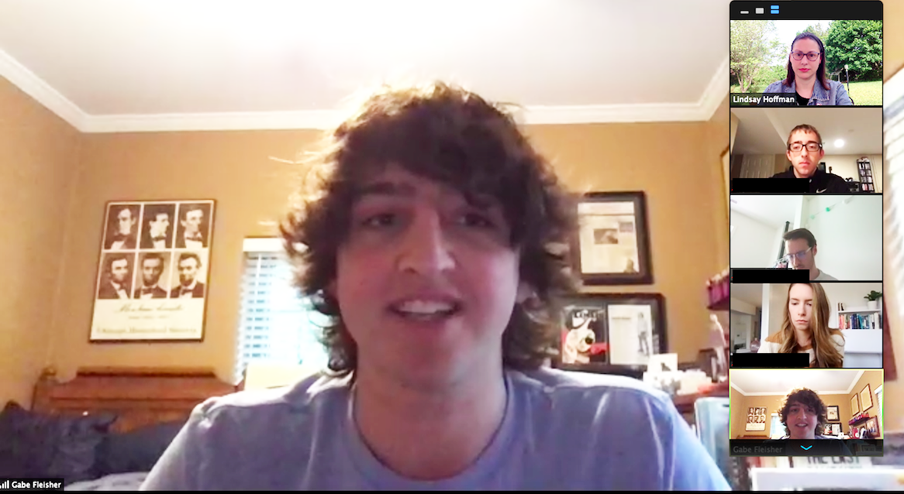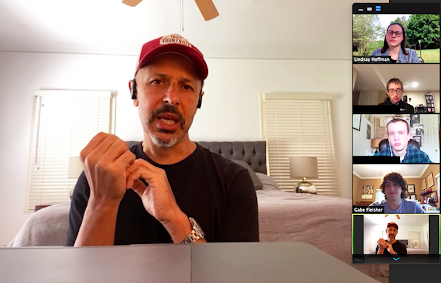Coming Together
Gabe Fleisher and Maz Jobrani talk political journalism and humor

By Laura Matusheski, University of Delaware sophomore and intern for the University of Delaware Center for Political Communication
JUNE 9, 2020″Comedian Maz Jobrani and teen journalist Gabe Fleisher seemed like an unlikely pair for a National Agenda Zoom reunion, but they soon learned that they have faced similar struggles in their careers. Fleisher and Jobrani shared their experiences about facing criticism on social media, and Jobrani said he admired Fleisher’s work and his ability to stick to his values. Lindsay Hoffman, Ph.D., director of the National Agenda, welcomed the two guests on May 20 for a conversation with National Agenda students and alumni, the final National Agenda Zoom “happy hour? for the semester.
Gabe Fleisher’s journalism career began at the age of nine, when he attended the 2009 presidential inauguration. In April 2011, Fleisher turned his love for politics into prose with a daily email newsletter to his only subscriber at the time”his mom. Seven years and over fifty-thousand subscribers later, the nonpartisan news publication, Wake Up to Politics, has received a considerable amount of media buzz. From interviewing a number of political figures, to appearing on major television news networks and being profiled on publications like the Washington Post and the New York Times, he has already made headway into the political sphere despite his young age. Fleisher was a part of the 2018 National Agenda Speaker Series, where he emphasized how much young voices matter.
When Hoffman asked whether he will cast his ballot as a first-time voter in the 2020 presidential election, Fleisher said that he struggles with discerning his personal opinions, because a crucial part of journalism is to see everything from all sides. “Since I”ve been objective in my writing for so long, it’s hard to see myself stepping into a voting booth and declaring my own opinions. But at the same time, I”ve been looking forward to voting for so long that I cannot imagine myself not doing it.” he said.
Hoffman noted that there has always been something particularly patriotic about physically going to the polls, “But let’s face it: [by the time the 2020 presidential election comes around] we will most likely have mail-in ballots, as well as rhetoric surrounding the validity of those ballots.” Fleisher explained how much voting will change this election season, and how much mail-in voting will grow exponentially as a result.
With the pandemic hanging over everyone’s shoulders, he highlighted the importance of presenting the facts, even when emotions are at an all-time high. “It truly feels like there’s no more important time to be a journalist,” said Fleisher. “It’s about reporting as dispassionately and objectively as possible.”
Now eighteen years old, Gabe will attend Georgetown University to study journalism in the fall. Although he is still uncertain of what lies ahead, he plans to continue writing for Wake Up to Politics to give his readers the daily political rundown. The students said they would be excited to have him back for another National Agenda event in the future.
Finding the punch line

After hearing from the young journalist, students and alumni got a special visit from accomplished comedian and author Maz Jobrani. As an Iranian-American, his jokes focus on race and the misunderstanding of Middle Easterners in America, and he published the best-selling 2015 memoir, I”m Not a Terrorist, But I Played One On TV. In the same year, Jobrani took the National Agenda stage to discuss race in America. (Watch a video of the full program here.) On Zoom, he talked with Dr. Hoffman and students about using politics and race in a framework for humor.
Hoffman asked Jobrani how he addresses race in his comedy without offending his audience. “It’s hard to bring comedy to serious subjects like this,” he said. “But my job is to find the punch line to every situation without blaming the victim.” Jobrani said he does this by either talking about my own experiences, or making fun of the racist in question.
Shannon Poulsen (AS16) discussed her work as a Ph.D. student in communicating political humor. In the current climate, comedians have taken stances and voiced their opinions, sometimes satirically and other times seriously. To avoid confusion, she asked Jobrani whether comedians should disclose certain statements as “humor.” Jobrani said it doesn’t hurt to label content as comedic, but he also doesn’t think it is necessary for comedians to do so because the nature of the content is already understood, for example, when people enter a comedy club.
Political leaders like President Donald Trump have always been incorporated into his routine in some way, and Hoffman wondered if “bashing? him as well as other figures would have an adverse effect.
“It’s our American freedom to make fun of our political leaders.” said Jobrani. “Our leaders are not infallible, they make mistakes. Trump never seems to take the responsibility for his words, and I try my best to reemphasize them.” He also mentioned how polarized our world feels now, and he reminded students that we are all still citizens of the United States, “Whether you are on the right or the left, you have the right to make fun of our leaders.”
Jobrani and Fleisher succeeded by discovering and following their passions. “It took me a while to get around to doing what I love doing,” said Jobrani. “But I’ve been doing it now for 22 years. And that’s it. Find your passion and go after it.” As National Agenda students face the “new normal?, sources of motivation like these will help them to reignite purpose and passion.
